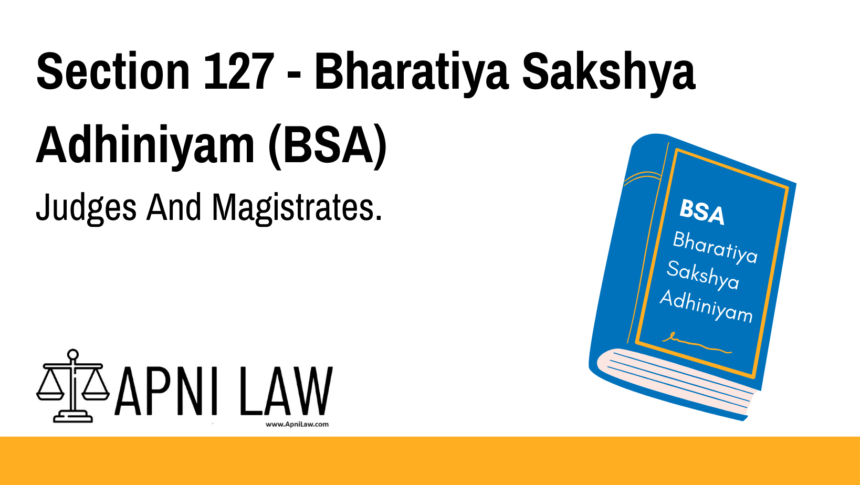Code: Section 127 BSA
No Judge or Magistrate shall, except upon the special order of some Court to
which he is subordinate, be compelled to answer any question as to his own conduct in
Court as such Judge or Magistrate, or as to anything which came to his knowledge in Court
as such Judge or Magistrate; but he may be examined as to other matters which occurred in
his presence whilst he was so acting.
Illustrations.
(a) A, on his trial before the Court of Session, says that a deposition was improperly
taken by B, the Magistrate. B cannot be compelled to answer questions as to this, except
upon the special order of a superior Court.
(b) A is accused before the Court of Session of having given false evidence before B,
a Magistrate. B cannot be asked what A said, except upon the special order of the superior
Court.
(c) A is accused before the Court of Session of attempting to murder a police officer
whilst on his trial before B, a Sessions Judge. B may be examined as to what occurred.
Explanation of Section 127 BSA
Section 127 of the Bharatiya Sakshya Adhiniyam, 2023, provides special protection to Judges and Magistrates in relation to their official conduct and knowledge obtained while presiding in court. This section maintains the dignity and independence of the judiciary by limiting the circumstances under which a Judge or Magistrate can be compelled to testify about their conduct or knowledge gained in a judicial capacity.
Key Points:
- Judges and Magistrates cannot be forced to answer questions about:
- Their own conduct while acting in a judicial role.
- Any information that came to their knowledge in that capacity.
- Exception: They may be compelled to answer such questions only if a higher or superior Court issues a specific order requiring them to do so.
- However, they may be examined about other matters (not related to their conduct or judicial knowledge) that happened in their presence while they were acting as Judges or Magistrates.
Illustration
Let’s understand the provision better with examples:
Example 1: Improper Deposition
A is on trial and claims that Magistrate B took a deposition improperly. Under Section 127, B cannot be forced to testify about this alleged misconduct unless a superior court gives a special order permitting such questioning.
Example 2: False Evidence Case
If A is accused of giving false evidence in front of Magistrate B, the prosecution cannot question B about A’s statement without special permission from a superior court.
Example 3: Assault During Trial
If A is accused of attempting to murder a police officer during his trial before Judge B, B may testify about what happened in court, as this relates to events he personally witnessed, not his judicial conduct.
Common Questions and Answers on Section 127 BSA
1. Can a Judge be forced to testify about their own conduct in court?
No, not unless a superior court gives a special order allowing such questioning.
2. Is this protection absolute?
No. While it offers broad protection, it can be overridden by a specific order from a higher court.
3. Can Judges testify about things they witnessed in court?
Yes, they can testify about occurrences in their presence during proceedings, provided these are not questions about their own judicial actions or decisions.
4. Why is this protection necessary?
This provision ensures judicial independence and prevents undue interference in the judicial process by restricting unnecessary or intrusive questioning of judicial officers.
5. Does this apply to both civil and criminal courts?
Yes. The protection under Section 127 applies to Judges and Magistrates across all courts, whether civil or criminal.
Conclusion
Section 127 of the Bharatiya Sakshya Adhiniyam plays a crucial role in maintaining the integrity and autonomy of the judiciary. It protects Judges and Magistrates from being compelled to testify about their judicial conduct or internal knowledge unless expressly ordered by a superior court. At the same time, it balances accountability by allowing their examination on matters they have personally witnessed during proceedings.
For more such structured legal updates and in-depth insights, visit ApniLaw.








